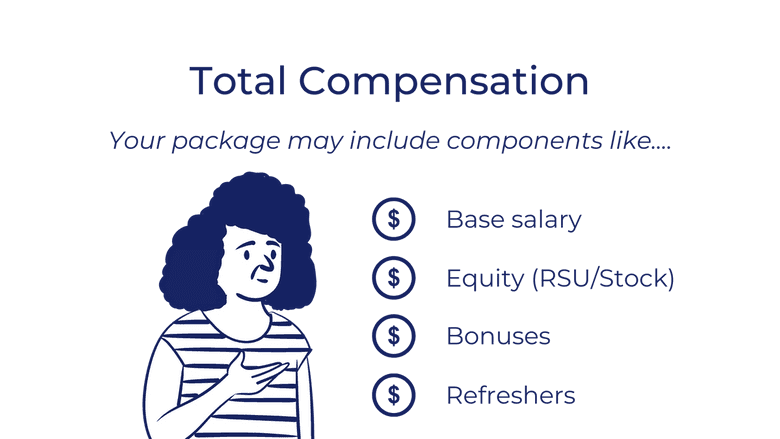What Is a Good Salary? What You Need to Know to Get What You Deserve
How do you know if you're being paid "enough" when salary data isn't everything?
There's a lot of money in tech. Software engineers (even those early in their careers) who work at a FAANG company can expect a starting salary in the range of $200k+.
But a big paycheck isn’t everything. After factoring in your cost of living, Bay Area rent, and other expenses, an annual salary of $150k won’t leave you with much left over. Be careful in estimating your expenses, especially if you're relocating.
So, how do you answer the question, “What is a good salary?” (for example, if you're negotiating salary). Don't just rely on salary data - think about your personal situation and what you need to reach your financial goals. Here’s a checklist of considerations:
- Location and cost of living
- Years of experience
- Work/Life balance
- Level, team, and industry
- Compensation package breakdown
- Other benefits and ability to work from home
Location & Cost of Living

The cost of living is all about your location. It's no secret that it costs more to live in a city than it does in a rural area. To see for yourself, compare New York City to Hudson, NY using a cost of living calculator.
If you grew up in a rural town in Nebraska, you’d notice a dramatic price hike if you move to Los Angeles. That’s why it’s essential to calculate the cost of living in any area and compare it to your salary.
Keep in mind costs like housing, utilities, transportation, and groceries. Depending on your situation, there may be other regular expenses too.
Consider Family & Marital Status
If you’re single or live with a partner who’s also earning, you have more financial flexibility with your salary requirements than someone who’s married with children.
Having a family is expensive, even if your spouse makes a comparable salary to yours. For a household bringing in $200,000 annually, the average cost to raise a child in its first year is around $52,000 — and the expenses only increase as the child gets older.
Housing alone accounts for 29% of child-rearing costs. And if you want to be a homeowner versus a renter, Bay Area housing prices aren’t cheap. The average asking price for a home in San Francisco is $1.3 million.
While a single tech worker would be alright with a total compensation (TC) of $190,000, someone who’s married with two kids would sit more comfortably with a TC of $300,000 or higher.
Here's an Example...
If you’re living in or around Silicon Valley, the most significant costs are housing, food, and transportation. Let’s use San Francisco as an example:
- The average monthly mortgage payment is about $4,254, and the average monthly rent for a one-bed, one-bath apartment is nearly $3,500.
- The national average for car insurance is around $1,548 a year, but in San Francisco, the average climbs up to about $2,257.
- Utilities cost an average of $154 per month.
- According to the Bureau of Labor Statistics, the average household pays around $5,200 a year on groceries, or $433 a month.
These averages are even more expensive than New York City, Seattle, and Los Angeles. You’d shell out $53,253 (or more) in basic living costs alone based on these figures. And that’s excluding other expenses like health insurance, car payments, phone bill, internet, clothing, and student loans.
Suddenly that six-figure salary doesn’t seem so good. You might not be thinking about it now, but factor in retirement and savings for a rainy day, and there’s a good chance you should be making much more than what you’re offered.
Years of Experience

If you’re a 23-year-old computer science graduate working your first job at a startup, you might not have much of an opinion in terms of salary — you just want to make “good money.” New grad salaries are negotiable, of course, but not as much as salaries for experienced professionals (there are some exceptions).
Someone with more years of experience (YOE) in your field, though, knows where they sit on the pay scale and what they want to make. A good salary hinges more on your YOE + level of skill - your interview matters a lot when big co's assign you a level.
Age is not a factor - the depth of experience is. For example, a 30-year-old who entered the field later through a boot camp rather than a traditional pathway (like earning a computer science degree), can expect to make less than a 26-year-old in the same company who has seniority, a CS degree, and more experience.
Companies expect to see a pattern of progress in both your knowledge and skills over time — and that’s not determined by age.
If you fail to show growth within a specific timeframe, you’ll find it difficult to move up the ladder (or across the lattice) as quickly as you had hoped. From a hiring manager’s perspective, your age shouldn't weigh in when it comes to determining your salary. The exception here being manager-level roles where some managers regard age as a proxy for emotional maturity and leadership skill.
Responsibility and YOE
Here’s a sample chart of the levels of responsibility you should expect based on your YOE:
(1-2 YOE) Starting out: New grad or little to no experience; usually receives guidance from upper-level team members
(3-5 YOE) Individual Contributor: Develops and owns moderate-to-complex tasks on a team and can lead a small project
(5+ YOE) Tech Lead: Leads and owns technical and complex projects
Here's an example...
This is an example of how an entry-level engineering role salary compares to that of someone with just a few years more experience
Google - Software Engineer, New Grad (YOE- 1.5)
- TC $198,760
- Base $125k, Target 15%, Sign on $55k, Equity $220k
Google - Software Engineer (YOE- 4)
- TC $309,000
- Base $160k, Target 15%, Sing on $60k, Equity $500k
Google is among the top-paying companies in tech, but these figures still offer perspective as to what you can expect to make with some experience under your belt.
Work-Life Balance

You see the natural progression here: With more YOE and responsibilities comes a better salary. But don’t lose sight of work-life balance. It’s critical to know what sort of hours you'll be putting in to pull those numbers.
For example, say you want to be an engineer at Amazon, where working 50-60+ hours per week on certain teams is common. While you might be making a stable salary, is it worth the stress? This is another question you have to ask yourself when it comes to salary.
You can’t put a big enough figure on your overall health and well-being, which is why it’s crucial to determine if a bigger salary is always worth it.
Think about the work-life balance at your current job. Do you sense that the workload dramatically increases as you advance levels, but base salary and total comp aren’t commensurate? If so, that’s a sign that your salary isn’t cutting it.
If you’re working harder for the same amount of pay as your colleagues at another company, it might be time to look elsewhere for better opportunities.
Level, Team, and Industry

Research Your Team and Industry
Outside of YOE, you need to account for your team and industry. To reference Amazon again, their retail and video tech teams are known to work rigorous hours and are often on call around the clock. Some team members report working 11-hour days, six days a week with unpredictable schedules.
If this type of commitment is required for your role, then you’ll certainly want to factor that in when landing on a number for your salary.
Determine Your Level
Tech companies often introduce career ladders or career lattices that show the typical path of progression for employees. Progress within the career track is divided based on your “level.”
For example, Google has eight levels in a standard engineering track, and Microsoft has 13. Levels imply your scope of responsibility and are more telling than a title or even seniority.
Typically, your position's level will put you in a starting salary range. We'll get to that next, and tell you how to handle it.
Compensation Package Breakdown

Total Compensation Package
The TC for your level and position might include the following...
- Base salary: The amount you’re paid every paycheck
- Equity compensation: Stocks offered either as restricted stock units (RSU) or traditional stock options
- Refresher: A stock “grant” after your vesting schedule ends
- Signing bonus: A one-time bonus you get the day you sign or the day you start work
- Annual bonus: A percentage bonus on top of your salary based on your performance level throughout the year
As a candidate, you usually won’t be able to negotiate your level, compensation, and job title all at once. Typically, you’ll discuss your level position, which will put you in a specific starting salary range along with your TC.
So, determining what a good salary is will change in light of your TC. That’s why it’s essential to know your worth. When considering your salary, review the stock options and bonuses most closely, as these tend to vary the most.
Stock Options
Offering stocks as a method of payment is called equity compensation, and it’s common among tech companies. In general, there are two types of stock offers:
- Restricted Stock Options (RSUs). These are more common at larger companies. These are company shares reserved for you when the company IPOs or sells. You don’t have to pay taxes on them until they’re released, and they typically come with constraints on where, how, and to whom you can sell them.
- Traditional stock options. These include incentive stock options (ISOs) or non-qualified stock options (NSOs). These are more common at startups. It works like this: You’re given the option to purchase company stocks at a discounted rate (known as the “strike price”). The strike price freezes when you join and you can choose to buy stocks when you leave.
Bonuses
In addition to stocks, you’ll want to find out if there are annual and signing bonuses. Signing bonuses usually come with a clause that you must pay back the bonus if you leave before a specified date. They tend to range from $10,000-$100,000 and are highly negotiable.
An annual bonus is based on performance and is often referred to as a target bonus. If you meet expectations, you’ll get a certain percentage bonus (quoted by the recruiter) on top of your base, along with a refresher (additional equity that is added later based on your contract).
Negotiating stocks and bonuses can get complicated and Candor is always available to help - just call us. The main thing to consider is that your TC ticks all of your boxes: You need a solid base salary, but you also want good equity compensation and bonuses.
Other Benefits and Working From Home

A good TC will include other benefits, such as:
- Paid time off (PTO)
- Health, dental, vision, and life insurance
- Retirement plans (such as 401k matching)
- Health club memberships
- Education reimbursement programs
- Work from home (WFH)
There are more benefits to consider, but non-negotiables are health insurance, retirement, and PTO.
It’s worth noting that the option to work from home is an increasing priority, especially in tech circles. Over the past decade, 83% of U.S. companies have introduced flexible workplace hours or policies.
WFH doesn’t just save you time, it can also save you money. A recent report found that remote employees save between $2,500-$4,000 a year working from home just half the year.
What Is a Good Salary?
Numbers count, but they're not the whole story. Salary involves hard figures, but it can be quite subjective. How much you make is contingent on where you live and your cost of living, but it also depends heavily on your level, career path, and total experience. The key is not to lock yourself into a fixed salary mindset - always take your personal financial goals into account.
When you know you’re worth more, look for new opportunities or negotiate with your manager during your next performance review. Do it right and you’ll get ahead and reap the benefits of a better deal.
The information provided herein is for general informational purposes only and is not intended to provide tax, legal, or investment advice and should not be construed as an offer to sell, a solicitation of an offer to buy, or a recommendation of any security by Candor, its employees and affiliates, or any third-party. Any expressions of opinion or assumptions are for illustrative purposes only and are subject to change without notice. Past performance is not a guarantee of future results and the opinions presented herein should not be viewed as an indicator of future performance. Investing in securities involves risk. Loss of principal is possible.
Third-party data has been obtained from sources we believe to be reliable; however, its accuracy, completeness, or reliability cannot be guaranteed. Candor does not receive compensation to promote or discuss any particular Company; however, Candor, its employees and affiliates, and/or its clients may hold positions in securities of the Companies discussed.
